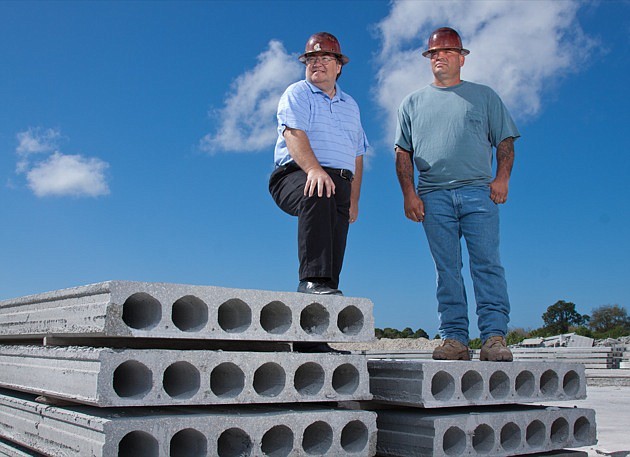REVIEW SUMMARY
Business. Colonial Construction, Concrete, Precast LLC and Colonial Concrete Co. LLC, Charlotte County.
Industry. Construction
Key. Company, just through bankruptcy, has plans to expand.
Victor Mellor sought a savior when his niche concrete business collapsed last summer.
John Bauer, meanwhile, sought a new challenge after he left a nearly two-decade career in executive finance with another kind of savior: the Diocese of Venice.
Mellor and Bauer now find each other in an unusual partnership that runs counter to the gloom still plastered to the construction industry like rubber cement. Indeed, more than half of the 50 largest construction companies on the Gulf Coast reported a decrease in annual revenues in 2010, according to an analysis by the Business Review.
But the Mellor and Bauer partnership, at least for now, saved 60 jobs and one company.
Bauer, a CPA, is the new CEO of the Charlotte County-based company Mellor founded, working for an undisclosed group of investors who've already put at least $2 million into the business. Mellor, a gruff multi-tattooed U.S. Marine, remains with the company as the chief operating officer.
“The business model works,” says Mellor, who co-founded the original company, Colonial Construction Co., in 1997. “We just had too much debt.”
Mellor built Colonial into one of the largest producers of pre-stressed structural floor and roof concrete in the southeastern United States. It had $20 million in annual sales and at least 80 employees during the peak of the boom. Sales have since dropped by at least 30%, Bauer says.
The company filed for Chapter 11 bankruptcy Aug. 25 in federal court in Charlotte County. M&I Bank, with a tab of $3.27 million, was owed the most money, according to a list of the top 20 creditors holding unsecured claims. G.E. Capital and Fort Myers-based Eastern Portland Cement Co. were two of the other creditors owed more than $300,000, court records show.
The group of investors who bought Colonial's debts made the purchase through Sarasota-based Gravitas LLC, which was formed in July 2009. Gravitas CEO Susan Flynn, one of the four investors, declined to name or elaborate on the other three individuals in the group — the majority owners who aren't named in Florida Division of Corporation documents.
“We feel (Colonial) had a quality product that was hampered by the economy,” says Flynn. “We feel they have an excellent opportunity of growing.”
Flynn is a longtime banker in Sarasota. She was a senior vice president and CFO for Sarasota Bank under Christine Jennings, who later ran several unsuccessful campaigns for U.S. Congress. Flynn also worked for Colonial Bank before she joined Gravitas.
The reborn Colonial run by Bauer is split into two companies: Colonial Construction, Concrete, Precast LLC, known as C3P, and Colonial Concrete Co. LLC. The businesses are run on a 22.5-acre facility in Placida, a resort town north of Gasparilla Sound.
“If we can survive this and come out on the other end, we will be one of the only ones left standing,” says Bauer, who took on the CEO role in January. “Then we can grow like crazy.”
Eliminate inefficiencies
One of Bauer's first steps at Colonial was to meet in person with some of Colonial's key suppliers and vendors, a list that included concrete suppliers and dry cement operations.
It was a difficult time, says Bauer. He defused it by being forthright. “The important thing is to let them know you take this seriously,” he says. “They just got punched in the gut.”
Bauer also defused the hard feelings by being generous: He offered to pay cash deposits on future jobs to some suppliers, for instance.
Bauer next went to work on the company's internal systems and processes, many of which were outdated, costly or both, he says. Colonial's system for taking orders, for example, was a template from a word processor document.
More inefficiency: Payroll checks were cut at non-scheduled times, which costs more in fees to the payroll service. And some materials were purchased weekly or monthly, instead of annually, which added more work and expense.
Bauer changed all these systems and anything else he could find that didn't work or could work better. “It's minor things,” he says, “but all of it adds up.”
A Massachusetts native, Bauer learned his efficiency-first code when he worked for CPA firms in St. Petersburg. He later worked in accounting for the Sun Coast Media Group, which publishes newspapers in south Sarasota County and Charlotte County. Bauer was also the CFO for Sun Coast.
But the bulk of Bauer's recent career, 18 years, was with the Diocese of Venice. The organization is an accountant's dream, in that it handles a wide variety of projects, from real estate to schools to a communications department that produces its own TV shows. The Diocese, says Bauer, had up to $30 million a year in construction projects.
Bauer also learned at the Diocese that he needed to champion the more-with-less philosophy, given the organization covers more than 50 parishes spread through 10 counties.
“I'm a real process-oriented person,” Bauer says. “I have to evaluate what's wrong and what steps we need to take to fix it.”
Costly operations
Bauer, though, says he is emboldened by the work Mellor did in assembling the guts of a formidable business at Colonial.
When Mellor and a business partner founded the company, the idea was to find a niche in the construction field by focusing on a type of concrete known called hollow core.
A hollow core slab is pre-stressed concrete that's sometimes used in floors of hotels, hospitals and apartment buildings.
The hook is hollow core concrete is more economical than standard concrete, says Mellor. It weighs less than typical concrete, takes less man hours to install, uses less rebar and comes with a lower insurance cost.
Colonial could produce at least 25,000 square feet of hollow core concrete at its main facility in Placida and a second facility in Georgia during its peak. The hollow core slabs come in a variety of sizes.
Projects that used Colonial's hollow core concrete in the company's heydays ran from hotels and schools to houses and office buildings.
Still, the operation was cost-heavy. Four extruders used to connect materials, for example, cost $50,000 apiece, according to court documents in the bankruptcy case. Specialized saws, forklifts and other gear ran the equipment costs alone to more than $400,000.
Those costs, and the company's debt, ran into the recession in late 2008 and early 2009, according to Mellor and court documents. That's when the work dried out. Moreover, Mellor had a financial dispute with a former partner, which is currently being litigated in federal court.
'No bailout'
Mellor and Bauer, not surprisingly, prefer to look ahead when it comes to Colonial. The 60 saved jobs, for example, which vary from truck drivers and administrative personnel to welders and plant employees, are a big source of pride. “This acquisition has been a blessing for all of the employees of the old Colonial and their families,” says Mellor.
Bauer boasts about another point: The money invested in the company and turnaround so far is pure capitalism, which stands in stark contrast to local and state government agencies that have thrown incentive money around lately with increasing frequency.
Says Bauer: “This was no government subsidy or bailout.”
That said, Bauer realizes his challenge now is to rebuild a business during a tough time in the industry, where margins are super-model thin.
“It's so competitive out there that it's hard to get sales where you can make money,” says Bauer. “Everybody is trying to survive, so you cut the bid to the bone in order to be competitive.”
Bauer will look in several directions to lead the growth mission. He's considering a few offers to buy companies, including a concrete block plant and a roofing tile facility, which would diversify the product base.
Prices for companies are so low in some cases that Bauer says he might buy a business and keep it on the sideline until the economy fully recovers.
Given the company's recent history, Bauer says he will keenly watch the debt on any potential transaction. “I also need to bet that we are in the bottom of the downturn,” says Bauer.
The company is even in the midst of repaving the concrete driveway that leads to the main office, a $50,000 project. It's a subtle and cosmetic move, yet one Bauer and Mellor hope will speak to their commitment to turn Colonial back into a winner.
Mellor is especially pumped up by all the changes and future prospects, particularly considering the dark days of the last two years. Says Mellor: “It's nice to come back on a high note.”






